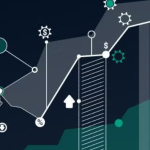How Technology is Shaping the Future of Jobs and Income Distribution

Technology is revolutionizing industries across the globe, and its effects on the job market are undeniable. With innovations in automation and artificial intelligence (AI), we’re witnessing dramatic shifts in how we work, who works, and how wealth is distributed. While technology is creating exciting opportunities, it’s also displacing traditional roles and raising concerns about income inequality. In this blog, we explore the evolving job market shaped by technology and the digital economy, with a focus on the new challenges and opportunities emerging for workers.
The Changing Landscape of Job Markets
The way people work has always been shaped by technology. The Industrial Revolution introduced machinery that replaced manual labor, while the rise of the internet ushered in the Information Age, creating new career opportunities in technology and services. Today, we are experiencing another transformation as AI, automation, and digital platforms redefine work. These technologies are not only replacing certain jobs but also creating entirely new ones, many of which didn’t exist just a few years ago.
For example, automation has streamlined repetitive tasks in fields like manufacturing and customer service, while AI is enhancing industries such as healthcare and finance. New job roles in data science, cybersecurity, and digital marketing are emerging, but the pace of change is so fast that many workers find it hard to keep up. To stay relevant, continuous learning and reskilling have become essential.
Automation and AI: Shaping Workforce Demands
AI and automation are changing the types of jobs that are in demand. In the past, automation mainly replaced routine, manual jobs. For instance, machines took over tasks like assembly line work and data entry. However, AI is challenging even more complex jobs that were once considered safe from automation. While professions like healthcare and education still require human interaction, AI is becoming a powerful tool to augment decision-making in these fields.
Moreover, as AI and automation become more integrated into business operations, there is an increasing need for workers who can manage and optimize these technologies. Roles such as AI specialists, machine learning engineers, and robotic process automation developers are becoming essential. This shift is driving job creation in tech-driven fields, while also reshaping existing industries that require new skills.
The Rise of Income Polarization
As technology advances, income inequality is becoming more pronounced. High-skill jobs in fields like software development and data science are in high demand, and those who possess these skills are being rewarded with high salaries. In contrast, jobs that are more vulnerable to automation, such as those in retail and hospitality, are seeing stagnating wages and job losses. This growing divide is contributing to income polarization, with a clear gap forming between high-income tech professionals and low-wage workers.
The transition to a more tech-driven economy further widens this gap. Jobs that require advanced technical skills and problem-solving abilities are becoming more valuable, while those with less specialized skill sets face fewer opportunities. Addressing this disparity will require a concerted effort to provide access to education and training for all workers, so they can acquire the skills needed for the future economy.
The Gig Economy and Flexible Work
Technology has given rise to the gig economy, where workers take on short-term, flexible jobs instead of traditional full-time positions. Platforms like Uber, TaskRabbit, and Fiverr allow people to work on their terms, providing a variety of income streams. While this model offers more freedom and flexibility, it also introduces challenges related to job stability, benefits, and fair wages.
Unlike traditional employment, gig work often lacks benefits like health insurance and retirement plans, leaving workers vulnerable to financial instability. As the gig economy grows, it’s crucial to develop policies that protect workers’ rights and ensure they receive fair compensation. In addition, technology has expanded the possibility of remote work, with many companies adopting hybrid or fully remote models. This flexibility allows employees to balance their personal and professional lives, but it also requires new strategies for managing teams and maintaining productivity.
The Need for Education and Upskilling
As technology continues to reshape the job market, reskilling and upskilling have become essential for workers to stay competitive. With automation replacing routine tasks and AI creating new job categories, workers must continuously adapt to the changing demands of the job market. Upskilling programs are particularly important for bridging the gap created by automation, as they enable workers to acquire the specialized knowledge required for emerging roles.
Online platforms like Coursera and LinkedIn Learning provide affordable and accessible courses in high-demand fields like data science, programming, and digital marketing. Additionally, boot camps and micro-credential programs allow individuals to quickly gain targeted skills that can be immediately applied in the workplace. Public and private sectors must collaborate to ensure workers have the resources and opportunities they need to succeed in a tech-driven economy.
Key Takeaways
The digital economy is transforming the job market in profound ways. While technology brings innovation and new opportunities, it also raises concerns about job displacement, income inequality, and the need for continuous learning. The key challenge moving forward will be ensuring that all workers can access the education and skills required to thrive in an increasingly digital world. By embracing lifelong learning and reskilling, we can help workers navigate the changes brought about by technology and create a more equitable economy for the future.


 English
English 











































































































































































































































































































































































